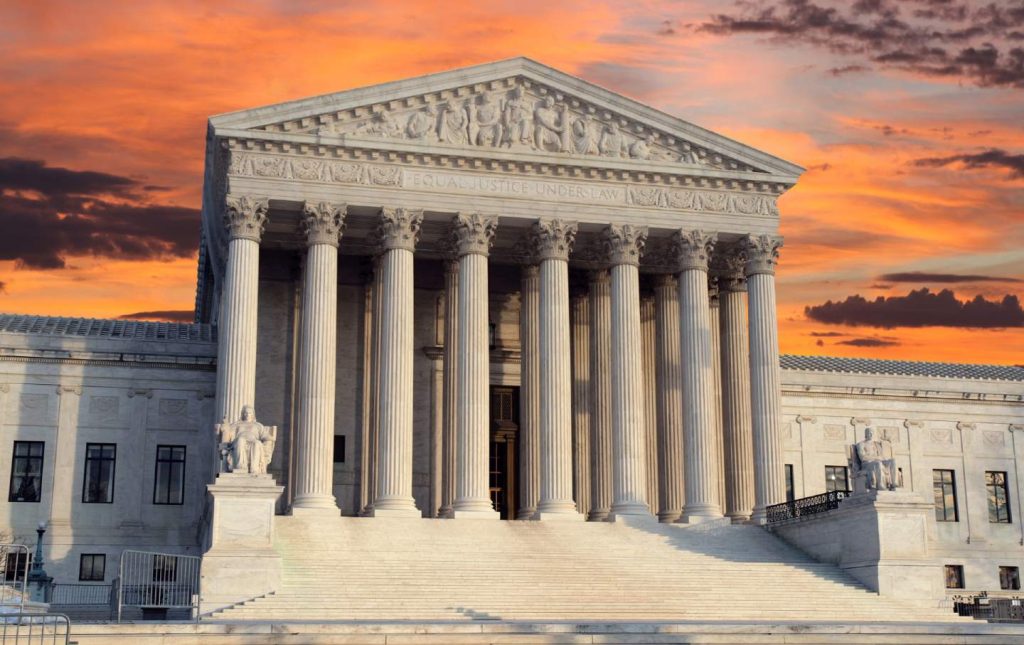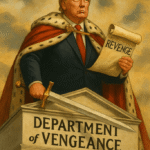The Supreme Court’s (SCOTUS) majority has seized many of the Constitutional powers given to Congress and the Executive branch to fulfill the priorities of Leonard Leo, their primary funder and promoter. Leo spent $1.6 billion through network of opaque nonprofits (“Leo’s Network”), to masterminded the appointments of conservative justices to the Supreme Court, including John Roberts John Roberts, Brett Karnaugh, Neil Gorsuch, Clarence Thomas, Samuel Alito, and Amy Coney Barrett, (“Leo’s Majority”) and Trump-appointed federal judge Aileen Cannon who ignored decades of precedent to dismiss the classified documents case against her appointer. Justice Thomas joked that Leo was the “number 3 most powerful person in the world.
Leo’s priorities have been: keeping Trump in office (Leo Priority 1); rolling back anti-discrimination protections in voting, including the ability of state legislatures to racially gerrymander to win elections (Leo Priority 2); , deregulation of corporations (Leo priority 3) restricting access to abortion, (Leo Priority 4) and public funding public of religious schools (Leo Priority 5).
His Majority complied on all fronts even if they had to pervert the Constitution and defy the Court’s precedent.
Conservative Justices and Leo’s Priorities on the Supreme Court
In Trump v. The United States , Conservative Justices and Leo’s Priorities on the Supreme Court gave Trump broad immunity and delayed his DC criminal trial to keep him in office until after the 2024 election. They held:
- Presidents are absolutely immune from all criminal prosecutions for the execution of the authority given to them by the Constitution, and not to any other branch of government. This means that neither Congress nor any court may interfere with the exercise of the President’s exclusive authority even if it violates a criminal law.
- The majority opinion worried that Presidents would be chilled from taking the bold action required of an independent Executive and impair their effectiveness. This is a fabricated concern that presumes there will be other Presidents who’s conduct will be as egregious as Trump’s. As SCOTUS Justice Frankfurter held, “the process of Constitutional adjudication does not thrive on conjuring up horrible possibilities that … won’t happen again in the real world”(at page 326 U. S. 583).
- A President is also presumed to be immune from prosecution for actions in areas not exclusively given by the Constitution unless the Government can show that criminalizing the act would not pose “dangers of intrusion on the authority and functions of the President” – something which hasn’t occurred in our history. Justice Frankfurter’s admonition bears repeating: that “Constitutional adjudication does not thrive on conjuring up horrible possibilities that … won’t happen again in the real world.” Here, Conservative Justices and Leo’s Priorities on the Supreme Court could excuse an insurrection by calling it an official act.
- Because a President has no immunity for unofficial acts but can for official acts, Conservative Justices remanded the case to the District Court to decide which charges in the January 6 indictment are for official and unofficial acts. Trump claimed that attempting to stop the certification of electors and overturning the 2020 election were official acts because – believe it or not — it was undertaken to ensure the integrity of the federal election. The Government countered that it was Trump’s “private scheme with private actors.” Conservative Justices held that determining who is correct requires a fact-specific analysis, so they remanded the case to the District Court to determine who is right. Four lower court judges had already concluded that Trump is not immune from prosecution of the charges in the indictment. The trial court had performed a fact-specific analysis But Conservative Justices ignored SCOTUS precedent holding that a trial court’s factual findings are taken as presumptive unless they are clearly erroneous, which Conservative Justices did not specify. Yet, they remanded the case to the trial court to redo the analysis. The decision will ultimately be appealed to SCOTUS, almost guaranteeing that the Trump’s trial won’t be decided after the election, not to mention that it’s not beyondConservative Justices to give Trump total immunity from all crimes alleged in the indictment.
- Trump is absolutely immune from prosecution for plotting the overturning the 2020 election with Justice Department officials because the Executive Branch, headed by the President, has the exclusive authority to decide which crimes to prosecute, essentially vanquishing the independence of the Justice Department.
- Pardoning is an exclusive Constitutional authority given to the President that cannot be impaired by any court. Coupled with the same majority’s attempt to delay Trump’s federal election interference case until 2025 so, if inaugurated, he could pardon himself.
- Conservative Justices also delayed the DC federal election interference trial against Trump until after the election by scheduling oral arguments on the last day of its term and not deciding the issue until five months after accepting its appeal. It is a decision to keep whether Trump committed a crime unanswered before the America votes. In contrast, it took SCOTUS just 16 days to unanimously decide that Nixon wasn’t immune from prosecution, one day to decide Bush v. Gore, and Trump’s defense team just 21 days to get a judge to hear its motion to disqualify Fani Willis from prosecuting Trump for his attempts to overturn the 2020 election.
Leo Priority 2 –States’s legislatures can racially discriminate against minorities to win elections.
- In Alexander v. South Carolina NAACP Conservative Justices upheld the South Carolina Republican legislature’s right to move 60% of Black voters from their Congressional district into a White-denominated district to ensure the election of the Republican candidate. The same majority, minus Barrett, previously held in Rucho. v. Common Cause that political gerrymandering is not the business of federal courts. The combination of these two rulings allows racial gerrymandering to win elections, ignoring that the purpose of racial gerrymandering is always to win elections. It’s now impossible to successfully challenge any gerrymandering in this Supreme Court.
- In Brnovich v. Democratic National Committee SCOTUS held that Arizona voting restrictions didn’t violate the 1965 Voting Rights Act (the VRA) which prohibits states from denying or abridging the right to vote based on race or color. The law discarded votes cast in non-designated locations and prohibited third parties from collecting ballots for delivery to designated polling places other than family, caregivers or share the same household. But only 18 percent of Native Americans living in rural counties receive mail at home, and many would have to travel up to two hours to reach a mailbox. As many as half don’t own cars and have to rely on friends and neighbors who are not allowed to help with transportation.
Chief Justice Roberts admitted that Arizona’s restrictions fall more heavily on Native Americans, but that the consequences are small even though they account for more than 60% of Arizona’s voters from Maricopa County and were twice as likely as whites to have their ballots discarded. Nonetheless, Conservative Justices decided those disadvantages don’t exceed “the usual burdens of voting.” To the contrary, they can make big differences. The votes that would be tossed exceed the margins of victory in the 2018 and 2020 elections. Trump lost Arizona by only 10,457 votes.
In Shelby v. Holder Conservative Justices struck down Section 4(b) of the VRA, which required states with histories of suppressing minority voting to clear voting law changes with federal authorities.Conservative Justices relied on the 10th Amendment, which reserves to the states powers not delegated to the federal government, but it doesn’t mention elections. The 15th Amendment however does. It expressly prohibits states from denying or abridging the right to vote based on race or color and gives Congress the power to enforce that prohibition. Requiring federal pre-clearance for states with a history of racial voter suppression would seem to fall clearly within that power. So, the 10th Amendment should not supersede the 15th. Shelby also invoked the antiquated theory of equal sovereignty (ES) which requires the Federal government to treat states equally. Leo’s Majority held that Section 4(b) of the VRA violated the Constitution because it singled out certain states for federal pre-clearance. But ES is nowhere in the Constitution; it’s not even a law. It was originally invented to challenge different criteria used to admit new states into the Union. The holding usurped the authority the 15th Amendment expressly bestowed on Congress.
Leo Priority 3 — Deregulation of Corporations.
In Loper Bright Enterprises v. Raimondo Conservative Justices overturned Chevron U.S.A., Inc. v. NRDC, which held that courts should defer to an Executive agency’s interpretation of legislation that’s ambiguous – no longer. In Loper, Leo’s Majority held that the Administrative Procedure Act requires the courts to decide whether an agency’s interpretation of ambiguous language complies with the statute. The holding transferred an enormous amount of policymaking from the federal agencies, that require tens of thousands of workers, to the Judiciary, the only unelected branch of government, which also lacks the personnel to do the job. The decision amounted to an indirect form of deregulation. Loper also unleashed a slew of corporate lawsuits challenging agency interpretations. And it’s only the beginning. The court’s will now be loaded down with second-guessing an agencies interpretations of ambiguous statutes.
In SEC v. Jarkesy Conservative Justices held that when the Securities and Exchange Commission, an agency created by Congress, seeks civil penalties against a defendant for securities fraud, the Seventh Amendment entitles the defendant to a jury trial, transferring more power from the Executive branch to the courts.
Leo Priority 4 — Overturning Roe v. Wade
Leonard Leo’s choice of federal judges was heavily guided by populating SCOTUS with judges willing to overturn Roe v. Wade. He found easy fodder in his friends Clarence Thomas, Samuel Alito and Donald Trump, who was then courting Christian Evangelists. They were all compliant and joined with Barret, Gorsuch and Kavanaugh in deciding Dobbs v. Jackson Women’s Health Organization which held that there’s no right to abortion in the Constitution.
Leo Priority 5 — Public funding of religious schools
In Carson v. Makin, Conservative Justices held that states that fund private schools must also fund religious schools.
The US Supreme Court is our last stop to unbiased justice. It’s there to base its decisions on the Constitution, statutes and legal precedent. Instead, Conservative Justices perverted the Constitution in order to turn Leo’s priorities into realities. Unless the Democrats can take the Presidency and both chambers of Congress and expand SCOTUS or impeach at least Alito and Thomas, due to their conflicts of interests, Leo and his Majority will continue to be the boss.








Your blog is a true hidden gem on the internet. Your thoughtful analysis and engaging writing style set you apart from the crowd. Keep up the excellent work!
Your blog has quickly become one of my favorites. Your writing is both insightful and thought-provoking, and I always come away from your posts feeling inspired. Keep up the phenomenal work!
Can you be more specific about the content of your article? After reading it, I still have some doubts. Hope you can help me.
Thank you for your sharing. I am worried that I lack creative ideas. It is your article that makes me full of hope. Thank you. But, I have a question, can you help me?
Thank you for your sharing. I am worried that I lack creative ideas. It is your article that makes me full of hope. Thank you. But, I have a question, can you help me?
Thanks for sharing. I read many of your blog posts, cool, your blog is very good. https://www.binance.com/bn/register?ref=UM6SMJM3
Can you be more specific about the content of your article? After reading it, I still have some doubts. Hope you can help me.
Thank you for your sharing. I am worried that I lack creative ideas. It is your article that makes me full of hope. Thank you. But, I have a question, can you help me?
Your point of view caught my eye and was very interesting. Thanks. I have a question for you.